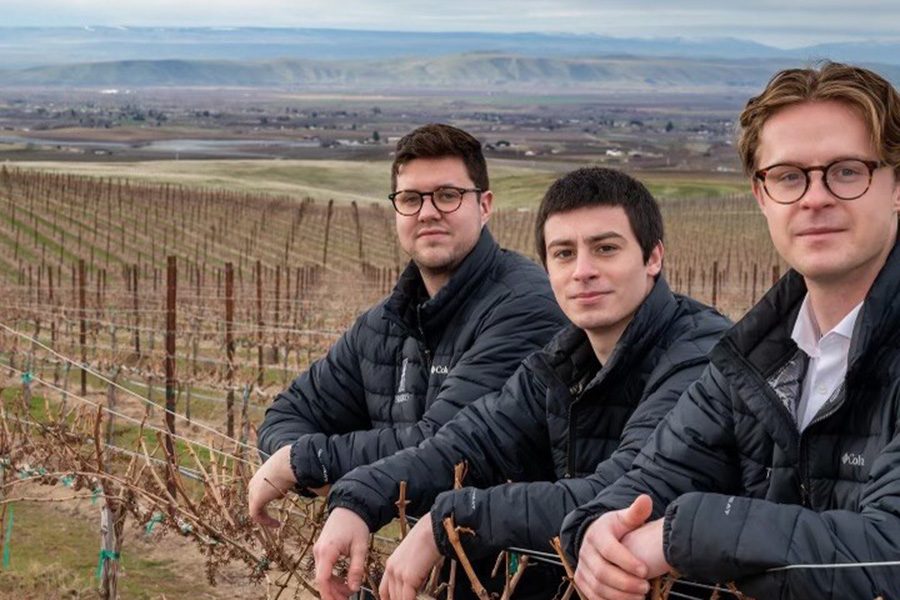
Home » Sparkling wine company moves in next to Clore Center
Sparkling wine company moves in next to Clore Center
Port of Benton actively pursues operator to oversee agribusiness-focused facility

Gabriel Crowell, left, Matthew Doutney and Andrew Gerow founded the winery Tirriddis in 2021. Now, they're opening a tasting room next to the Walter Clore Center, a move the Port of Benton hopes will spark more interest in the center.
Courtesy TirriddisAugust 16, 2024
As the Port of Benton pursues a new operator for its vacant Walter Clore Center in Prosser, three friends from Washington State University Tri-Cities have opened a tasting room to showcase their sparkling wines in the adjacent pavilion.
Port officials say Tirriddis’ opening should help spark interest in the Clore Center, which hasn’t had a steady operator since the nonprofit that operated the wine and culinary center closed it in 2020. WSU Tri-Cities signed a facility use agreement the following year but it announced in April that it would not be renewing it when the current agreement expires this month.
Tirriddis will open its tasting room in the pavilion at 2041B Wine Country Road on Aug. 21. The winery spent a few years at Port of Benton’s Prosser Wine and Food Park in an incubator space before beginning to grow.
“This was a natural extension,” said Diahann Howard, executive director of the Port of Benton. “We’re pleased to have them, they’ve been a great partner, and ... a great example of being able to tell a wonderful story.”
Launching a winery
The trio behind Tirriddis, Gabriel Crowell, Andrew Gerow and Matthew Doutney, are not originally from Washington, but they ended up living near each other at WSU Tri-Cities in 2018 with a common interest in fine wine.
Washington presented an opportunity, since the prices aren’t as high as other places to start a winery. Crowell, winemaker and co-owner of Tirriddis, described the state as “the last great bastion of free agriculture and initiative for young people to get into the wine industry.”
During their time at school, the trio started a wine shop, Non-Vintage Wines, in Richland. They began making their own wine and connecting with industry partners, eventually opening the winery in the Food and Wine Park.
Crowell said that the initial endeavor was self-financed. Later, the wine and wine shop sales, along with a supportive and generous community, helped to fund the business.
Now they’ve grown to four employees outside of the founders and produce about 6,000 to 8,000 cases of wine per year. Their pavilion space was built in 2011, and it shares 16 acres of port land with the Walter Clore Center, built in 2014.
Tirriddis’ pavilion lease will last for three years with the option to extend, port officials said.
It still will occupy its space at 2880 Lee Road, Suite B, to be used as a warehouse and space for private events, Crowell said.
The tasting room in the pavilion will be 100% hospitality focused, he said.

Sparkling wine company Tirriddis is opening a tasting room at the pavilion next to the Walter Clore Center.
| Photo by Rachel VisickOperator needed
Meanwhile, the port is actively pursuing an operator to oversee the Walter Clore Center, which is dedicated to the agricultural industry and related community events. It includes office space, a commercial grade kitchen, a multipurpose event space and more.
“It’s an incredible asset that really helps increase agritourism and education around a very well-known agricultural wine industry in Prosser,” Howard said.
In 2023, more than 30 industry events took place at the center.
An operator is needed to balance the center’s various interests, including public and industry events and maintaining its educational displays.
Someone needs to be on site, Howard said. The Prosser Chamber of Commerce has helped coordinate some of the center’s public events, and the Prosser Economic Development Association has offered its support as well.
In the spring, the port announced it was seeking an operator for the center.
Howard said the port received an application, but it is not yet certain if the potential operator will come to an agreement due to specific grant requirements.
The U.S. Economic Development Administration provided a grant to build the $4 million Clore Center under certain conditions related to the use of the center, including housing educational displays, meeting spaces, a commercial kitchen, a tasting room and more showcasing Washington wine and food products.
The port is “trying to get some clarity to those grant requirements, to see if there’s any level of flexibility,” Howard said.
The port hasn’t heard back from yet, but once it does, Howard said it might open applications for the operator position again.
She also hopes to spend more time talking with local education providers and agricultural industry associations about possible needs and opportunities to coordinate.
It may be frustrating for people who don’t know about the restrictions in place on the facility, and it is also difficult for the port to see a great facility not put to its full use. “We want to be good stewards of it,” Howard said.
‘Perfect place’
The location of the Tirriddis pavilion and the Walter Clore Center is a key draw for visitors, and the new tasting room may help generate activity around the center.
From Walla Walla to Seattle, people have to pass through Prosser in either direction, Crowell said. “This is one of the fundamental stops. The heart of Washington wine country is the Yakima Valley, and even more specifically, around 70% to 80% of all wine grown and made is made here in Prosser.”
Howard described the center’s location as “in a perfect place for it in Prosser, which is the heart, the center of so much agricultural history.”
Tirriddis’ new tasting room showcases some of the region’s geography. Floor-to-ceiling windows look out over a lawn, facing the Yakima River. The pavilion boasts a large amount of outdoor seating, as well.
Tirriddis sources its grapes from the Horse Heaven Hills and the Rattlesnake Hills American viticultural areas, specifically Pinot Gris and Chardonnay.
At the moment, there’s more grapes planted than there is demand, Crowell said, so Tirriddis sources grapes from growers with that excess.
Sparkling wine is unusual in Washington. Crowell said that, due to a market oversupply, winemakers are focusing more on quality and Washington’s diverse offerings. That’s where Tirriddis has captured some attention, he said.
Sharing the stories
Although Tirriddis’ pavilion does not face the same grant restrictions as the Clore Center, education is an important aspect for the winery as well.
“That’s where we came from – WSU,” Crowell said. “We started this brand in school, we’ve grown it in school. And people want to feel like they’re learning something when they go out to a winery or go out to a brewery or anything in agriculture … that’s why this space made so much sense to us right away, too.”
Even the name is educational: Crowell said it comes from the terms “tirage,” “riddle” and “disgorge” – “three fundamental processes and traditional methods of sparkling wine.”
Crowell said that part of the Clore Center’s ambition is to be “a transformative experience for people who can enter the Washington wine industry at the heart of where it’s actually being grown.”
“That’s our responsibility as producers and suppliers to showcase that well here.”
That’s one of the things the Port of Benton hopes the Walter Clore Center can do: tell “the story of Washington wine and ag products,” Howard said. The center is envisioned as a hub of ongoing education, a place to have agricultural products available, farm-to-table style.
Events and classes would take place there, covering information on agricultural production, marketing and innovation.
“It’s an educational space, it’s what this entire area was for, the Walter Clore Wine and Culinary Center, it’s all about education, and that’s really core to our grounds,” Crowell said.
“I would really just like to see it thriving with students at all levels and the community with ongoing education and being able to basically tell the great story of our region’s agriculture,” Howard said. “… All of this comes together there.”
Latest News Real Estate & Construction Food & Wine
KEYWORDS August 2024
Related Articles




